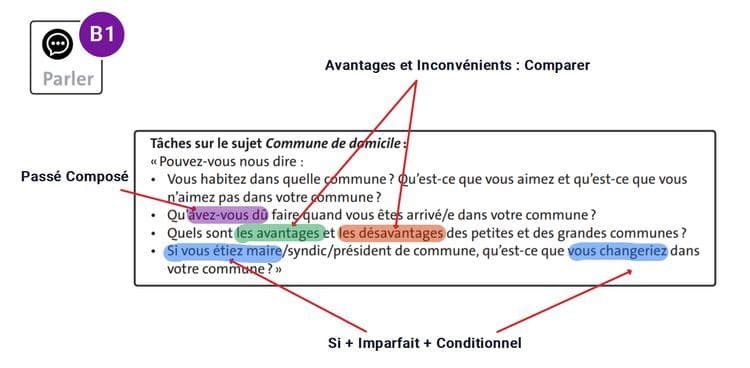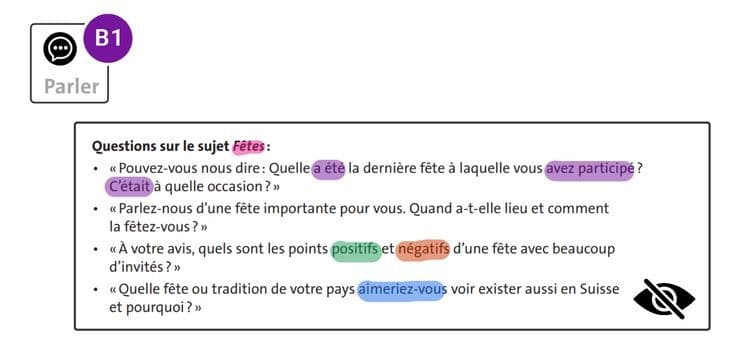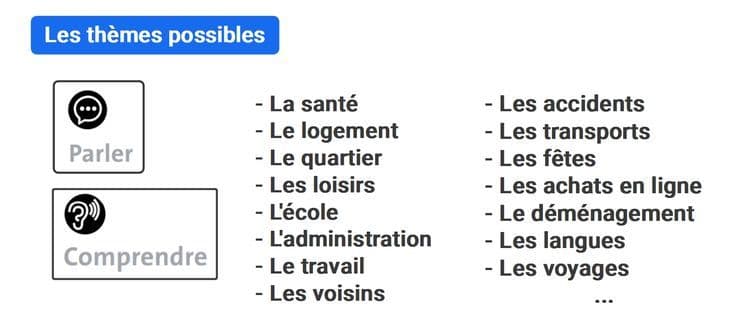6 - The FIDE Test: B1 Oral Exam in Detail
October 22, 2024
10/22/2024
For the B1 oral section, the examiner will ask you to choose between two topics. These topics are once again related to everyday life, and you will have to answer a series of 4 or 5 questions.
Let's take a look at a well-known theme, "la commune de domicile", to explore the different types of questions you might encounter and how to respond effectively.

Describing an Experience
One of the first questions you might be asked is very simple:
« Vous habitez dans quelle commune ? Qu'est-ce que vous aimez et qu'est-ce que vous n'aimez pas dans votre commune ? »
These are direct questions, relatively easy to answer. Then, the examiner might ask you to talk about your personal experience:
« Qu'avez-vous dû faire quand vous êtes arrivé(e) dans votre commune ? »
To answer this question, you will naturally need to use the passé composé or the imparfait to describe what you did and how it went.
« Quand je suis arrivé dans ma commune, j'ai dû me présenter à la mairie puis chercher un logement. Ensuite, j'ai fait toutes les démarches administratives pour les abonnements et l'assurance sociale. Nous nous sommes aussi renseignés pour trouver une école pour les enfants ... »
The Positive and Negative Aspects of a Situation
When you're asked to talk about the positive and negative aspects of a situation, it's important to know the right expressions to make comparisons and list the advantages and disadvantages of it. A typical question could be: « Quels sont les avantages et les inconvénients de vivre en ville comparé à la campagne ? » This question allows the examiner to assess your ability to provide a balanced view and evaluate different perspectives.
For the advantages, you might say ➞ « En ville, les transports publics sont bien développés, c'est très pratique pour se déplacer. Il y a aussi beaucoup d'activités culturelles, de sorties et on a accès à beaucoup plus de choses de manière générale. »
For the disadvantages ➞ « Du point de vue des inconvénients, je pense que vivre en ville peut être plus fatigant au quotidien que de vivre à la campagne. Il y a beaucoup de bruit, de pollution, de stress. Finalement, il y a aussi peut-être aussi moins de solidarité en ville qu'à la campagne. »
Taking a Stance on a Hypothetical Situation
This question is an opportunity to show your mastery of the conditional tense and potentially the hypothetical structure (« si + imparfait + conditionnel »). It's also a chance to be creative while demonstrating your ability to organize your ideas.
A typical question might be: « Si vous étiez maire de votre commune, que changeriez-vous ? »
You can simply reuse the conditional from the question ➞ « Je changerais plusieurs choses comme ... »
If you're more comfortable with the conditional, use other verbs ➞ « Si j'étais maire de ma commune, j'ajouterais des places de parking dans le village, je ferais une aire de jeux pour les enfants ... »
A Second Example: Celebrations

To illustrate these same skills with another theme, let's take the example of celebrations. You might be asked: « Quelle a été la dernière fête à laquelle vous avez participé ? » Here, you will need to describe an experience in the past, using the passé composé and possibly the imparfait.
Then, a question could focus on the positive and negative aspects of a celebration: « Quels sont les aspects positifs et négatifs d'une fête avec beaucoup d'invités ? » Finally, a hypothetical situation could be: « Quelle fête de votre pays aimeriez-vous voir exister en Suisse et pourquoi ? », which once again requires the use of the conditional to answer appropriately.
Possible Themes
For the B1 level, common themes include health, housing, leisure, work, the neighborhood, learning French, etc...
But don't worry! Some topics come up more often than others in the exam, and thanks to regular feedback from my students, I'll be able to prepare you on the right themes and questions to ensure you are as prepared as possible.

To sum up

➞ At the B1 level, the examiner offers two topics, and you choose the one you prefer.
➞ Look at the list of frequently recurring themes: health, housing, leisure, work, the neighborhood …
➞ One or two questions are about past experiences that need to be described using the passé composé and the imparfait.
➞ Anticipate the question on the advantages and disadvantages of a situation by learning set expressions.
➞ Prepare for the final question, which very often requires the use of the conditional.
Don’t wait any longer, start your preparation for free, benefit from a tailored preparation, and receive all the necessary documents to best prepare for the exam.
Don't wait any longer and give yourself the best chance to pass the FIDE test!
Would you like some practical advice on how to approach the test with maximum confidence? Continue reading

Get Your Free Study Plan
Latest posts
Browse all posts
Subscribe to our newsletter
Stay informed and get a free video

